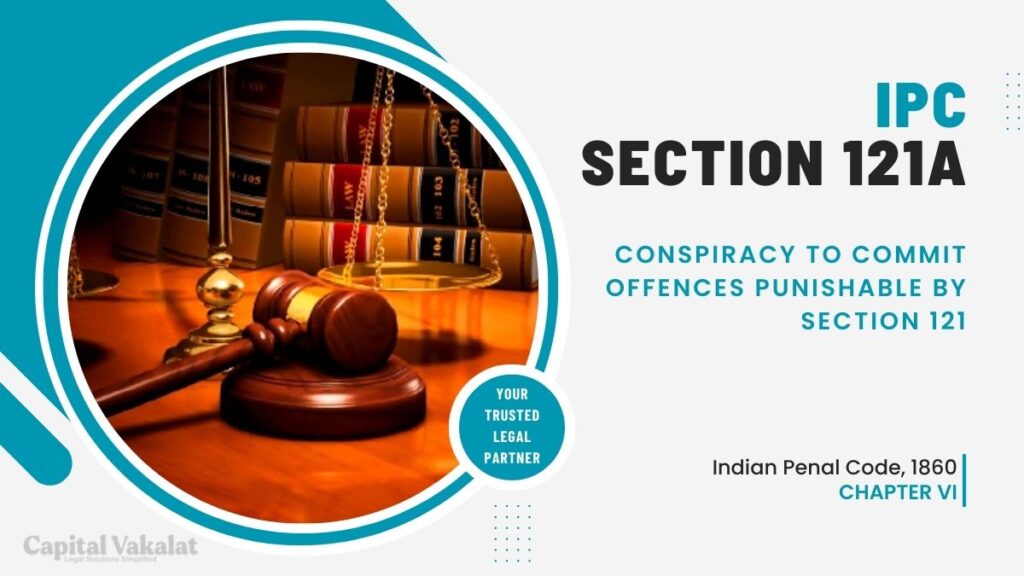In the complex world of Indian criminal law, Section 121A of the Indian Penal Code (IPC) stands out as a critical provision. This section deals with conspiracy to commit offenses punishable under Section 121 of the IPC.

In this article, we will delve into the nuances of Section 121A, understanding its historical context, elements, punishments, and the contemporary relevance of this legal provision.
Understanding Section 121A of the Indian Penal Code (IPC)
Section 121A of the IPC addresses the act of conspiring to commit offenses punishable under Section 121. Section 121, in turn, pertains to offenses related to waging, or attempting to wage, war against the Government of India. Section 121A assumes significant importance as it deals with the premeditated planning and coordination involved in such serious offenses.
Historical Context of Section 121A IPC
This provision has a deep-rooted historical context dating back to the colonial era when India was under British rule. The British Raj faced several rebellions and uprisings, leading to the establishment of these sections to curb activities that were seen as a threat to their rule. Even after independence, Section 121A remains a vital part of the Indian legal system.
Elements of Conspiracy under Section 121A IPC
To establish a case under Section 121A, certain elements need to be present:
- Agreement: There must be a mutual agreement between two or more individuals to commit an offense under Section 121.
- Intent: The conspirators must have the intent to commit the offense.
- Act or Omission: There should be an act or omission in furtherance of the conspiracy.
Punishments for Offenses Punishable under Section 121A IPC
Conspiracy to commit offenses under Section 121 is a grave offense. Those found guilty under Section 121A may face rigorous imprisonment for a term that may extend to ten years, along with a fine.
Recent Cases and Controversies
Over the years, Section 121A has been at the center of several legal battles and controversies. High-profile cases have brought this section into the limelight, sparking debates on its relevance and scope in modern India.
The Significance of Section 121A IPC
Section 121A is vital in maintaining national security and preventing actions that could threaten the sovereignty of India. It serves as a deterrent against planning or conspiring to wage war against the nation.
Legal Defenses in Section 121A IPC Cases
Defendants can assert certain defenses in cases related to Section 121A, including lack of intent or insufficient evidence of a conspiracy. Legal experts play a crucial role in safeguarding the rights of the accused.
Challenges in Prosecution
The prosecution of Section 121A cases can be challenging due to the need to prove the existence of a conspiracy. Collecting evidence and establishing intent can be intricate and often requires thorough investigation.
The Need for Amendments
In light of evolving times and complex geopolitical scenarios, legal experts and scholars have called for a reevaluation of Section 121A to ensure it remains relevant while safeguarding individual liberties.
Conclusion
Section 121A of the IPC serves as a vital legal provision to combat the conspiracy to commit offenses against the state. Its historical significance and contemporary relevance underline its importance in maintaining national security and integrity.
For more in-depth knowledge and insights, consult with legal experts. To understand the complete details of Section 121A IPC, consult the official legal documentation.
FAQs
What is the historical background of Section 121A IPC?
Section 121A has its roots in the colonial era, introduced during British rule in India to counteract uprisings.
What are the main elements of conspiracy under Section 121A?
The key elements include an agreement, intent, and an act or omission in furtherance of the conspiracy.
How is Section 121A significant in contemporary India?
Section 121A plays a crucial role in preserving national security by preventing conspiracies to wage war against the country.
Are there any proposed amendments to Section 121A?
Legal experts have suggested amendments to ensure its relevance in the modern era, while safeguarding individual rights.